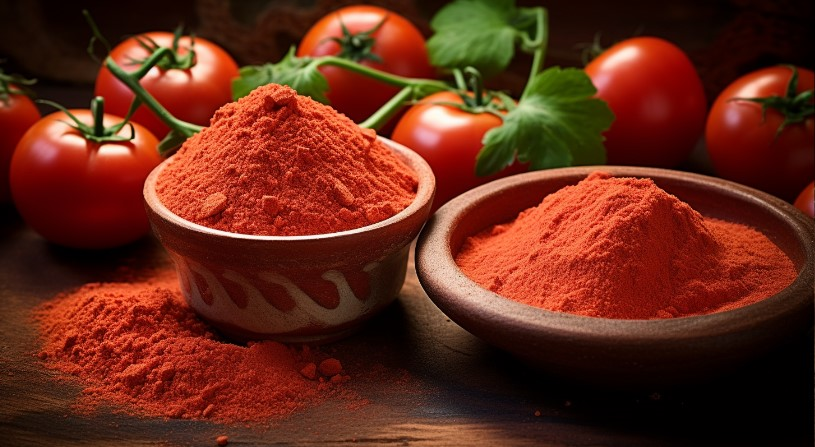Apakah Likopen dapat menjadi Anti-Penuaan?

Apa itu likopen?
Lycopene is a carotenoid found in plant foods and a red pigment. Dark red needle-like crystal, soluble in chloroform, benzene and oil, but insoluble in water. It is unstable to light and oxygen and turns brown when exposed to iron. Molecular formula C40H56, relative molecular mass 536.85. There are 11 conjugated double bonds and 2 non-conjugated double bonds in the molecular structure, forming a linear hydrocarbon. It has no physiological activity of vitamin A, but has strong antioxidant function.
The content is higher in mature red plant fruits, especially tomatoes, carrots, watermelons, papayas and guavas. It can be used as a pigment in food processing and is also commonly used as a raw material for antioxidant health foods.
Lycopene is widely found in tomatoes, tomato products, watermelon, grapefruit and other fruits. It is the main pigment in ripe tomatoes and one of the common carotenoids.
In 1989, MASCIO discovered that lycopene has the highest singlet oxygen quenching activity among all carotenoids. Subsequently, research on the function of lycopene has become a hot topic. The research content involves the absorption and metabolism of lycopene, the reduction of lycopene in the risk of prostate cancer and other tumors and cardiovascular diseases, and the extraction of lycopene. and measurement methods, etc.
Source of likopen
Mammals cannot synthesize lycopene on their own and must obtain it from vegetables and fruits. Lycopene is mainly found in foods such as tomatoes, watermelon, grapefruit and guava. The amount of lycopene in tomatoes varies with variety and ripeness.
The higher the ripeness, the higher the lycopene content. The lycopene content in fresh ripe tomatoes is generally 31 to 37 mg/kg. The lycopene content in commonly consumed tomato juice/sauce is about 93 to 290 mg/kg depending on the concentration and preparation method. Fruits with higher lycopene content are also There are guava (about 52mg/kg), watermelon (about 45mg/kg), grapefruit (about 14.2mg/kg), etc. Carrots, pumpkins, plums, persimmons, peaches, mangoes, pomegranates, grapes and other fruits and vegetables can also provide a small amount of lycopene (0.1 to 1.5 mg/kg).
Lycopene effect
The long-chain polyunsaturated olefin molecular structure of lycopene makes it have strong free radical elimination ability and antioxidant power. Current research on its biological effects mainly focuses on antioxidants, reducing the risk of cardiovascular disease, reducing genetic damage and inhibiting the development of tumors.
Enhance the body’s oxidative stress capacity and anti-inflammatory effects
Oxidative damage is considered to be one of the main causes of increased incidence of cancer and cardiovascular and cerebrovascular diseases. The in vitro antioxidant capacity of likopen has been confirmed by many experiments. The ability of lycopene to quench singlet oxygen is more than twice that of the currently commonly used antioxidant β-carotene and 100 times that of vitamin E.
Protect cardiovascular and cerebrovascular diseases
Lycopene can deeply remove vascular waste, regulate plasma cholesterol concentration, protect low-density lipoprotein (LDL) from oxidation, repair and improve oxidized cells, promote the formation of intercellular glial cells, and enhance blood vessel flexibility. A survey study showed that serum lycopene concentration was negatively correlated with the incidence of cerebral infarction and cerebral hemorrhage. Research on lycopene’s anti-atherosclerosis in rabbits shows that lycopene can effectively reduce serum total cholesterol (TC), triglyceride (TG), and low-density lipoprotein cholesterol (LDL-C) levels in rabbits. The effect is equivalent to that of fluvastatin sodium. Other studies have shown that lycopene has a protective effect on local cerebral ischemia. It mainly inhibits glial cell activity and reduces the area of cerebral perfusion injury through antioxidant and free radical scavenging effects.
Protect skin
Lycopene also has the function of reducing skin damage from radiation or ultraviolet (UV). When UV irradiates the skin, the lycopene in the skin combines with the free radicals generated by the UV to protect the skin tissue from damage. Compared with the skin without UV irradiation, the lycopene is reduced by 31% to 46%, and the content of other ingredients is almost the same. constant. Studies have shown that daily intake of lycopene-rich foods can combat UV and prevent erythema caused by UV exposure. Lycopene can also quench free radicals in epidermal cells and has a significant effect on fading age spots.
Enhance immunity
Lycopene can activate immune cells, protect phagocytes from their own oxidative damage, promote the proliferation of T and B lymphocytes, stimulate the function of effector T cells, promote the production of certain interleukins and inhibit the production of inflammatory mediators. Studies have found that taking lycopene capsules in moderate doses can improve the body’s immunity and reduce the damage to the body’s immunity caused by acute exercise. It will have the effect of improving fertility.
() ()